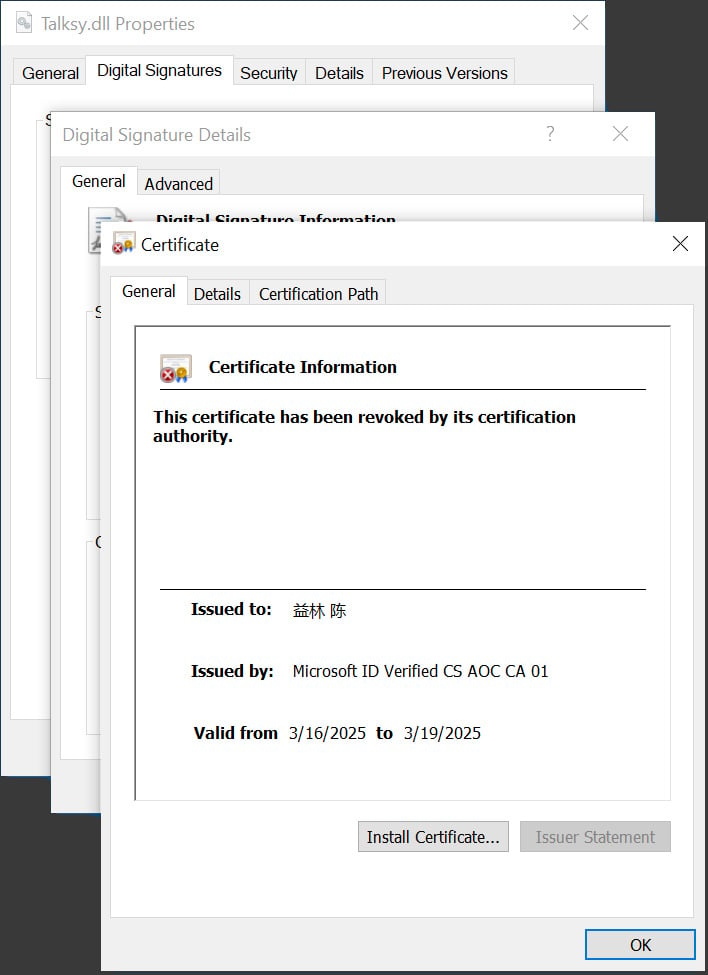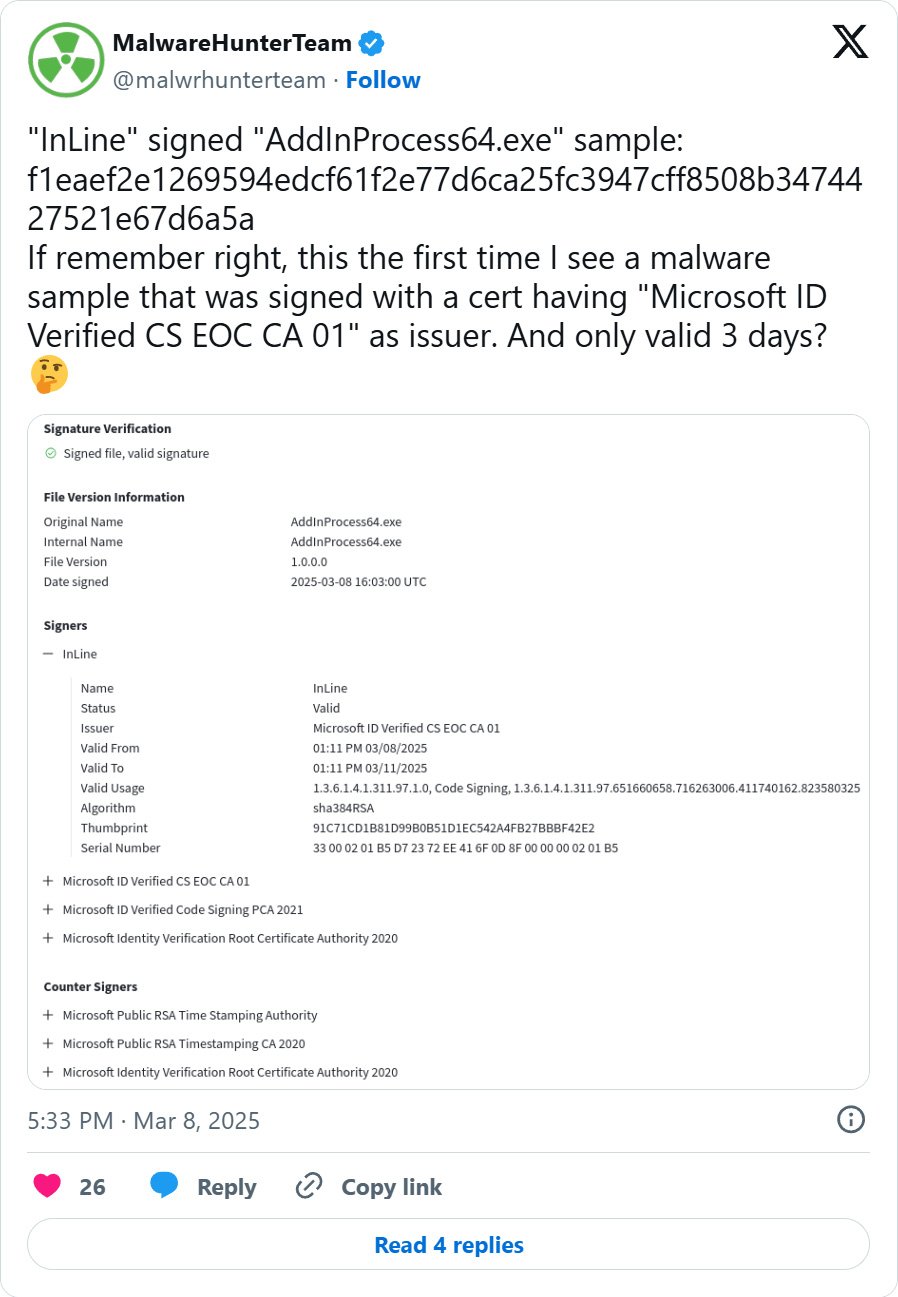Cybercriminals are abusing Microsoft’s Trusted Signing platform to code-sign malware executables with short-lived three-day certificates.
Risk actors have lengthy wanted code-signing certificates as they can be utilized to signal malware to look like they’re from a professional firm.
Signed malware additionally has the benefit of probably bypassing safety filters that might usually block unsigned executables, or a minimum of deal with them with much less suspicion.
The holy grail for risk actors is to acquire Prolonged Validation (EV) code-signing certificates, as they routinely acquire elevated belief from many cybersecurity applications as a result of extra rigorous verification course of. Much more necessary, EV certificates are believed to realize a popularity enhance in SmartScreen, serving to to bypass alerts that might usually be displayed for unknown recordsdata.
Nonetheless, EV code-singing certificates might be tough to acquire, requiring them to be stolen from different corporations or for risk actors to arrange faux companies and spend hundreds of {dollars} to buy one. Moreover, as soon as the certificates is utilized in a malware marketing campaign, it’s normally revoked, making it unusable for future assaults.
Abusing Microsoft Trusted Signing service
Not too long ago, cybersecurity researchers have seen risk actors using the Microsoft Trusted Signing service to signal their malware with short-lived, three-day code-signing certificates.
These malware samples are signed by “Microsoft ID Verified CS EOC CA 01” and the certificates is simply legitimate for 3 days. Whereas the certificates expires three days after being issued, it is very important be aware that executables signed with it can nonetheless be thought-about legitimate till the issuer revokes the certificates.
Since then different researchers and BleepingComputer have discovered quite a few different samples utilized in ongoing malware campaigns, together with these utilized in a Loopy Evil Traffers crypto-theft marketing campaign [VirusTotal] and Lumma Stealer [VirusTotal] campaigns.

Supply: BleepingComputer
The Microsoft Trusted Signing service launched in 2024 and is a cloud-based service that enables builders to simply have their applications signed by Microsoft.
“Trusted Signing is a full code signing service with an intuitive expertise for builders and IT professionals, backed by a Microsoft managed certification authority,” reads a Microsoft announcement for the service.
“The service helps each private and non-private belief signing situations and features a timestamping service.”
The platform has a $9.99 month-to-month subscription service designed to make it simple for builders to signal their executables, whereas additionally providing extra safety.
This elevated safety is achieved through the use of short-lived certificates that may simply be revoked within the occasion of abuse and by by no means issuing the certificates on to the builders, stopping them from being stolen within the occasion of a breach.
Microsoft additionally says certificates issued by way of the Trusted Signing service present an analogous SmartScreen popularity enhance to executables signed by its service.
“A Trusted Signing signature ensures that your software is trusted by offering base popularity on sensible display, consumer mode belief on Home windows, and integrity verify signature validation compliant,” reads an FAQ on the Trusted Signing web site.
To guard in opposition to abuse, Microsoft is at present solely permitting certificates to be issued beneath an organization title if they’ve been in enterprise for 3 years.
Nonetheless, people can enroll and get authorized extra simply if they’re okay with the certificates being issued beneath their title.
An easier path
A cybersecurity researcher and developer often called ‘Squiblydoo,’ who has been monitoring malware campaigns abusing certificates for years, advised BleepingComputer that they consider risk actors are switching to Microsoft’s service out of comfort.
“I believe there are a number of causes for the change. For a very long time, utilizing EV certificates has been the usual, however Microsoft has introduced modifications to EV certificates,” Squiblydoo advised BleepingComputer.
“Nonetheless, the modifications to EV certificates actually aren’t clear to anybody: not certificates suppliers, not attackers. Nonetheless, as a consequence of these potential modifications and lack of readability, simply having a code-signing certificates could also be ample for attacker wants.”
“On this regard, the verification course of for Microsoft’s certificates is considerably simpler than the verification course of for EV certificates: as a result of ambiguity over EV certificates, it is sensible to make use of the Microsoft certificates.”
BleepingComputer contacted Microsoft concerning the abuse and was advised that the corporate makes use of risk intelligence monitoring to seek out and revoke certificates as they’re discovered.
“We use lively risk intelligence monitoring to continuously search for any misuse or abuse of our signing service,” Microsoft advised BleepingComputer.
“Once we detect threats we instantly mitigate with actions equivalent to broad certificates revocation and account suspension. The malware samples you shared are detected by our antimalware merchandise and we now have already taken motion to revoke the certificates and stop additional account abuse.”



